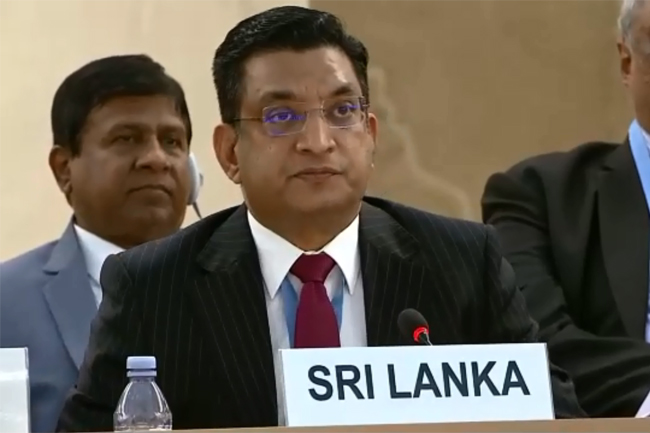PTA will be replaced with national security legislation - Ali Sabry tells UNHRC
September 12, 2022 06:53 pm
Sri Lankan Foreign Minister Ali Sabry told the 51st Session of the Human Rights Council in Geneva that the government was committed to working with the Office of the High Commissioner for Human Rights (OHCHR) on improving human rights, but would object to any international judicial intervention that it sees as anti-constitutional.
On the latest protests following the economic crisis, Sabry said the government planned a truth-seeking mechanism to promote reconciliation, and referred to work on constitutional reform to promote anti-corruption measures and trim presidential powers.
“The outset I reiterate Sri Lanka’s unwavering commitment towards advancing, securing and protecting the human rights of our people and continuing our engagement with the council in a spirit of cooperation and dialogue,” he said.
“In keeping with our commitment notwithstanding our categorical rejection of resolution 46 (I), we have submitted Sri Lanka’s detailed response to the High Commissioner’s report.”
He said Sri Lanka remains cognizant of an acutely sensitive to the events that have taken place in the recent past. The severe economic crisis ammoniating from factors, both internal and external, offer many lessons for all, he said.
“We recall this in context, the indivisibility of Human Rights as enshrined in the Vienna declaration and program of action.”
He said the government is extremely sensitive to the social economic hardships faced by the Sri Lankan people and has initiated immediate multipronged measures to ensure their well-being through a provision of supplies essential to the life of the community.
The minister said a staff-level agreement has been reached with the International Monetary Fund and discussions on debt restructuring are in progress. The government is in dialogue with the UN agencies as well as bilateral partners to protect the most vulnerable from the adverse impacts of the crisis, he said.
“The recent changes that have taken place bear testimony to our continuity commitment to upholding our long-standing democratic principles and norms. The constitutional rights to peaceful assembly and expression guaranteed the democratic space for our people to exercise their rights.”
In this regard, transition to the law, resulting in criminal and unlawful activity were addressed, in accord with the law and the constitution in circumstances where such freedoms were abused by elements with vested interest to achieve undemocratic political ends, Sabry claimed.
He emphasized that notwithstanding the severe constraints and challenges, Sri Lanka remains firmly committed to pursuing tangible progress in the protection of Human Rights and reconciliation through independent, domestic institutions.
“Sri Lanka along with several members of this council have opposed resolution 46/1 fundamentally disagreeing with its legitimacy and objectives. We have consistently highlighted that the content for the resolution, its operative paragraph 06 in particular violates the sublimity of the people of Sri Lanka and the principle of the UN charter.”
“Once again we are compelled to categorically reject any follow up measures to the resolution as well as the related recommendation and conclusion by the High Commissioner. It is observed that the High Commissioner’s report makes extensive reference to economic crimes apart from the ambiguity of the term; it is a matter of concern that such reference exceeds the mandate of the OHCHR.”
He said the proposed 22nd Amendments to the Constitution introduces several salient changes which would strengthen the democratic governance and independent oversight of key institutions and combat corruption including through the constitutional recognition of the UN convention against corruption.
He pointed out that measures aimed at promoting reconsolidation and human rights, if they are to be meaningful and sustainable, must be based on cooperation with the country’s concerns, be compatible with their aspiration with people and be consonant within basic legal framework.
“We endeavor to establish a credible truth seeking mechanism within the framework of the constitution,” the minister said addressing the UN human rights council on Monday.
He said the contours of a model that would suit the particular condition for Sri Lanka are under discussion.
The Sri Lankan foreign minister also said that the Prevention of Terrorism Act (PTA) will be replaced with a national security legislation in accordance with international best practices.
He said that the recommendation of the presidential commission of inquiry has resulted in progressive amendment to the Prevention of Terrorism Act (PTA) and the release of the detainees. Further recommendations are awaited, he added.
“As we delivered on the honorest task of review and reform of the PTA this year to further enhance Human Rights we will replace the PTA with a more comprehensive national security legislation in accordance with the international best practices.”
He said the recent delisting of groups and individuals will provide further impotence for the constructive dialogue.
“We will continue to provide the necessary support and resources to strengthen the functioning of independent domestic mechanisms including the Office of the Missing Persons, the Office for Reparation, and the Office for National Unity and Reconciliation and the Human Rights Commission of Sri Lanka.
The outreach to the overseas Sri Lankans encompassing all communities will be expanded through the establishment of an office for overseas Sri Lankans, he said.
“In upholding human rights, we have benefited from the considerable expertise available with other countries as well as the UN. We will seek further advice and support on the best practices as we proceed and as deemed necessary,” he emphasized.
He said Sri Lanka has maintained regular and constructive engagement with the UN treaty bodies, special procedures and universal periodic review process.
“We look forward to proactively engage in the upcoming UPR fourth cycle. We have facilitated two visits by the office of High Commissioner to Sri Lanka this year and provide an unimpaired access.”














